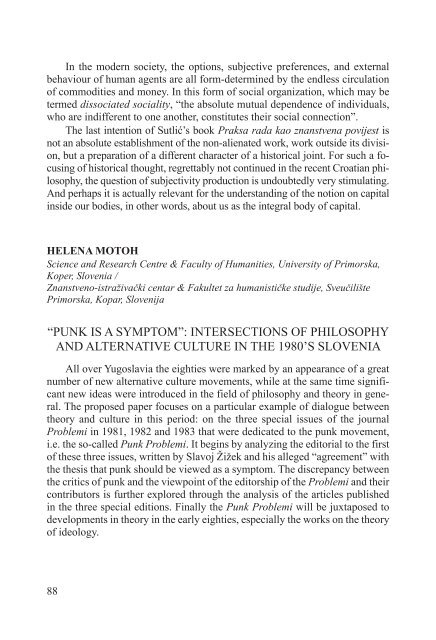Programska knjižica - Hrvatsko filozofsko društvo
Programska knjižica - Hrvatsko filozofsko društvo
Programska knjižica - Hrvatsko filozofsko društvo
You also want an ePaper? Increase the reach of your titles
YUMPU automatically turns print PDFs into web optimized ePapers that Google loves.
In the modern society, the options, subjective preferences, and external<br />
behaviour of human agents are all form-determined by the endless circulation<br />
of commodities and money. In this form of social organization, which may be<br />
termed dissociated sociality, “the absolute mutual dependence of individuals,<br />
who are indifferent to one another, constitutes their social connection”.<br />
The last intention of Sutlić’s book Praksa rada kao znanstvena povijest is<br />
not an absolute establishment of the non-alienated work, work outside its division,<br />
but a preparation of a different character of a historical joint. For such a focusing<br />
of historical thought, regrettably not continued in the recent Croatian philosophy,<br />
the question of subjectivity production is undoubtedly very stimulating.<br />
And perhaps it is actually relevant for the understanding of the notion on capital<br />
inside our bodies, in other words, about us as the integral body of capital.<br />
HELENA MOTOH<br />
Science and Research Centre & Faculty of Humanities, University of Primorska,<br />
Koper, Slovenia /<br />
Znanstveno-istraživački centar & Fakultet za humanističke studije, Sveučilište<br />
Primorska, Kopar, Slovenija<br />
“PUNK IS A SYMPTOM”: INTERSECTIONS OF PHILOSOPHY<br />
AND ALTERNATIVE CULTURE IN THE 1980’S SLOVENIA<br />
All over Yugoslavia the eighties were marked by an appearance of a great<br />
number of new alternative culture movements, while at the same time significant<br />
new ideas were introduced in the field of philosophy and theory in general.<br />
The proposed paper focuses on a particular example of dialogue between<br />
theory and culture in this period: on the three special issues of the journal<br />
Problemi in 1981, 1982 and 1983 that were dedicated to the punk movement,<br />
i.e. the so-called Punk Problemi. It begins by analyzing the editorial to the first<br />
of these three issues, written by Slavoj Žižek and his alleged “agreement” with<br />
the thesis that punk should be viewed as a symptom. The discrepancy between<br />
the critics of punk and the viewpoint of the editorship of the Problemi and their<br />
contributors is further explored through the analysis of the articles published<br />
in the three special editions. Finally the Punk Problemi will be juxtaposed to<br />
developments in theory in the early eighties, especially the works on the theory<br />
of ideology.<br />
88

















